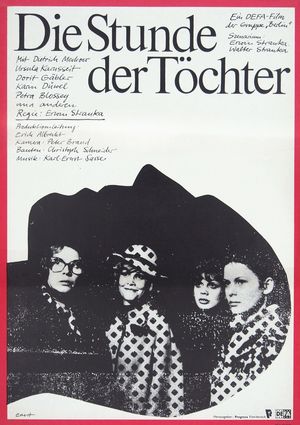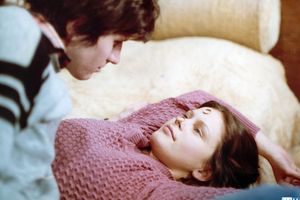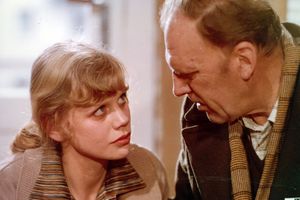Die Stunde der Töchter
Director: Erwin Stranka, 96 Min., Color, Feature Film
Deutsche Demokratische Republik (DDR)
DEFA-Studio für Spielfilme, 1980
- Film/Video Format
- 35 mm
- Length in m
- 2634
- English Title
- The Daughter´s Hour
- Premiere Date
- Release Date (for Cinema)

(Dir.: Erwin Stranka, 1980) Graphic Design: Hans Eberhard Ernst
Short Summary (English)
A life-threatening heart attack confines Richard Roth to the hospital bed. There, Richard, who is in his late fifties, asks himself what will remain of him and his life. What happened to his four daughters? Do they take after him? How have they developed? His youngest daughter Nanny, who is still living with her father, gets her three other siblings to Weimar to visit their father. The dedicated engineer Ruth, who is working in a shipyard and actively lives the party’s concepts, is very similar to her ill father. Despite her professional success, she lives a lonely private life. The third daughter Gerda is living in divorce although she is pregnant. Her two children live with their father. Furthermore, there is Eva, who gave up her job as a teacher to fully concentrate on her life as the hedonist wife of a surgeon. But her life plan comes to nothing, when her husband leaves her. After having recovered from his illness, Roth wants to straighten out the lives of his daughters, but he soon realizes that everyone has to take responsibility for his own life.
(Quelle: filmportal)

(Dir.: Erwin Stranka, 1980) Photography: Frank Bredow, Klaus Zähler

(Dir.: Erwin Stranka, 1980) Photography: Frank Bredow, Klaus Zähler
Film Crew
- Director
-
- Erwin Stranka
- Script
-
- Erwin Stranka
- Scenario
-
- Erwin Stranka
- Walter Stranka
- Camera
-
- Peter Brand
- Film Editing
-
- Evelyn Carow
- Cast
-
- Dietrich Mechow (Richard Roth)
- Ursula Karusseit (Ruth)
- Dorit Gäbler (Eva)
- Karin Düwel (Gerda)
- Petra Blossey (Nanny)
- Lothar Schellhorn (Peter Wille)
- Karl Sturm (Brigadier Fuchs)
- Michael Gwisdek (Dr. Lutz Winkler)
- Günter Grabbert (Schuldirektor)
- Carl Heinz Choynski (Heinz Jung)
- Jaecki Schwarz (Wolfgang Keller)
- Bernd Schramm (Klaus Zaubitzer)
- Stanislaw Brankatschk (Bernd)
- Hilmar Baumann (Arzt)
- Trude Brentina (Frau Schmitz)
- Peter Kalisch (Max Meiler)
- Wilhelm Koch-Hooge (Prof. Scholbin)
- Ruth Kommerell (Richterin)
- Arnim Mühlstädt (Zibulka)
- Rudi Reich (Postbote Fiete)
- Annemarie Siemank-Ripperger (Schwester)
- Ernst-Georg Schwill (Mann im Zug)
- Rudolf Ulrich (Wolff)
- Renate Usko (Augenärztin)
- Erik Veldre (Sekretär)
- Anja Franke (Kind Silke)
- Yvonne Franke (Kind Anke)
- Diana Franka (Kind Heike)
- André Lange (Kind Uwe)
- Jörg Ringel (Kind Jens)
- Mathias Geißler (1. Junge von Gerda)
- Tobias Runge (2. Junge von Gerda)
- Willi Schrade (Boxer)
- Hannes Stelzer (Philatelist)
- Peter Pauli (Moser-Imitator)
- Horst Papke (Crossfahrer)
- Michael Klobe (Crossfahrer)
- Willi Neuenhahn (Crossfahrer)
- Günter Drescher (Crossfahrer)
- Siegfried Bartschat (Crossfahrer)
- Werner Riemann (Crossfahrer)
- Barbara Braumann (geb. Müller) (Frau Wille)
- Horst Giese (Mann mit Aktentasche)
- Paul Berndt (Arzt)
- Hansjoachim Felber (Pfarrer)
- Klaus Powollik-Ronay (Trabantwäscher)
- Werner Pfeifer (Wachmann)
- Alfred Bohl (Pförtner im Goethehaus)
- Marianne Epheser (Frau in der Post)
- Regina de Reese (Frau in der Post)
- Karl Sturm (Fuchs)
- Heinz Berlau (Hannes)
- Michael Scharffenberg (Heiner)
- Norbert Witzke (Briefmarkenverkäufer)
- Sieglinde Zeitel (Brigadierin)
- Veit Stiller (Torsten)
- Eva Steingräber (Ärztin im Kreißsaal)
- Irmtraut Lüttich (Hebamme)
- Karin Beewen (Dame im Antiquariat)
- Eva König (Kassiererin)
- Gabriele Garsoffky (Lehrerin)
- Assistant Director
-
- Ilse Goydke
- Klaus Powollik-Ronay
- Production Design
-
- Christoph Schneider
- Script Editing
-
- Werner Beck
- Music
-
- Karl-Ernst Sasse
- Sound
-
- Gerhard Baumgarten
- Gerhard Ribbeck
- Costume Design
-
- Barbara Braumann (geb. Müller)
- Make-Up
-
- Willi Gesche
- Waltraud Dietze
- Production Management
-
- Erich Albrecht
- Unit Production Management
-
- Dieter Krüger
- Karl-Heinz Rüsike
- Theo Scheibler
- DEFA Photography
-
- Frank Bredow
- Klaus Zähler
Short Summary (German)
Der Endfünfziger Richard Roth, Arbeiter und zuletzt als Kaderleiter tätig, stellt sich angesichts einer lebensbedrohenden Herzattacke die Frage, was aus seinen vier Töchtern geworden ist, was von ihm in ihnen weiterleben wird. Nanny ist die jüngste und lebt als Einzige noch beim Vater. Sie ruft die anderen ans Krankenbett. Ruth ähnelt ihrem Vater vielleicht am meisten. Sie ist engagierte Parteifunktionärin auf einer Werft, aber privat eine einsame Frau. Eva hat ihren Beruf als Lehrerin aufgegeben, um nur noch die attraktive Chirurgengattin zu spielen. Sie verliert den Halt, als ihr Mann sie verlässt. Gerda ist schwanger und lebt in Scheidung. Die zwei Kinder, die sie schon hat, überlässt sie dem Mann. Und Nanny hat noch alles vor sich.
(Quelle: Das zweite Leben der Filmstadt Babelsberg. DEFA-Spielfilme 1946-1992)
Short Summary (Other Languages)
A seguito di un attacco cardiaco, Richard Roth, un operaio prossimo alla sessantina, divenuto di recente dirigente di partito, chiama le sue figlie al proprio capezzale. Ruth è quella che gli assomiglia di più: funzionaria di partito in un cantiere, conduce una vita privata piuttosto solitaria. Eva ha rinunciato a l'insegnamento, per fare la bella moglie di un chirurgo, che l'ha poi abbandonata. Gerda è incinta, ma separata. Solo Nanny, la più giovane, che vive ancora con lui, ha tutta la vita davanti. (Italienisch)



